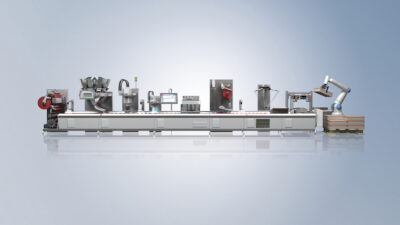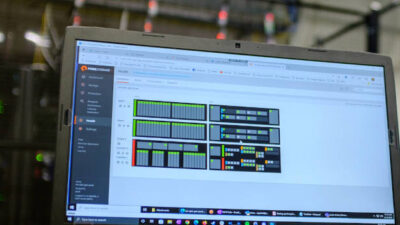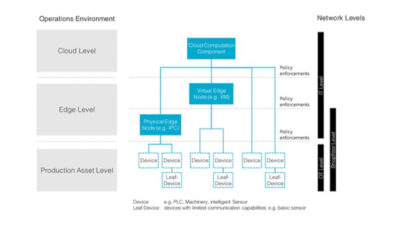Korsnäs AB makes the specialty board and papers used in packaging liquid and food products. Papermaking at the moment is an intensely competitive industry. In fact, Korsnäs says competition within its carton board segment is higher as a result of imports from low-cost countries like Brazil and Chile, the weakened state of the U.
Korsnäs AB makes the specialty board and papers used in packaging liquid and food products.
Papermaking at the moment is an intensely competitive industry. In fact, Korsnäs says competition within its carton board segment is higher as a result of imports from low-cost countries like Brazil and Chile, the weakened state of the U.S. dollar, and increased production capacity inside and outside Europe.
Moreover, rising costs for both pulpwood and energy will continue to have an impact that won’t be offset by price increases.
John Leppiaho, a product manager with automation vendor GE Fanuc Intelligent Platforms , says of the industry in general, “Margins are shrinking; materials and operations costs are rising. Small differences in efficiency and inventory levels have a disproportionate effect on profitability.”
This explains the interest Korsnäs’ took in an imaginative vendor managed inventory (VMI)-based trading relationship offered by Eka Chemicals , a Bohus, Sweden-based provider of chemicals used in papermaking for bleaching, sizing, and coating processes.
Eka Chemicals, a subsidiary of Amsterdam-based Akzo Nobel , is using “manufacturing intelligence” capabilities provided by GE Fanuc to rewrite the art of the possible—taking systems and technologies more usually associated with the plant floor and applying them to add value to commercial transactions on behalf of customers like Korsnäs.
Simply put, says Stefan Malmsten, industrial IT manager for Eka Chemicals, the company replenishes chemicals held in customers’ storage tanks based on automatically generated “suggested orders” triggered by a network of systems—stretching from GE Fanuc Proficy applications to an SAP enterprise suite and an Eka Chemicals custom-built and designed terminal located at customers’ plants.
Typically, adds Malmsten, Eka Chemicals can help its customers achieve a 10-percent reduction in inventory levels—a not insignificant reduction in an industry as hard-pressed as papermaking.
Shipped by road tanker, and arriving “just in time,” VMI deliveries offer other benefits to Eka Chemical’s customers, too, enthuses Malmsten.
“Not only do we make sure that chemical tanks at customers’ mills never run dry, but we receive, verify, and unload the deliveries. Customers pay only for the chemicals they actually use via a single monthly invoice,” he says. “It’s not about moving costs around within the supply chain. It’s about removing them altogether.”
Global disbursements
Today a diverse group of Eka Chemicals customers in Europe, North and South America, and Asia are making use of the company’s VMI offering. But its roots, notes Malmsten, lie in a strategic decision made by Eka Chemicals back in the mid-1990s to invest in state-of-the-art plant automation and monitoring technologies to drive down costs and wring efficiencies out of its manufacturing operations.
In time, he explains, this evolved into a rich set of tools and applications—some from GE Fanuc, some from other vendors—that now forms what Eka calls its “process-information” environment, including the Proficy Plant Applications suite for quality, efficiency, and batch analyses; Proficy Real-Time Information Portal; Proficy iFIX HMI and SCADA; and Proficy Historian.
For Eka Chemicals’ VMI offering, one of the critical parts of the whole system is a Short Message Service (SMS) mobile Internet mail application. When a customer signs up for Eka Chemical’s VMI service—or even just wants to evaluate it—Eka installs a custom-designed data collector and transmitter.
Essentially, says Malmsten, it’s a small computer backbone running Proficy Historian that connects to the customer’s own control system.
“The customer isn’t required to run any Proficy applications, although it’s perfectly possible that they could be Proficy users in practice,” notes Malmsten. “The idea is to interface with as broad a range of control systems as possible.”
The role of the data collector is to continually monitor production parameters such as running speed and inventory levels, and then within seconds relay that information back to Eka Chemicals headquarters via a wireless modem built into the data collector. GSM-based General Packet Radio Service (GPRS) is the mobile technology of choice in Europe, he adds, with CDMA being the fallback choice in locations where—like North America—GPRS is less widely available.
Only as a last resort, explains Malmsten, is a traditional landline used.
“By intention, we want to eliminate wired connections. We don’t want to worry about the customer’s network, or going through their firewall,” says Malmsten. “We simply want to get at the data we need, format and encrypt it, and then transmit it using the wireless modem and antenna built into the data collector.”
That very simplicity greatly reduces installation time for a new VMI relationship.
“We can set it up in a couple of days, show them VMI in use, and if they don’t like it, or don’t want it, we can just take it out and reuse the equipment elsewhere,” says Malmsten.
Deriving the right answer
Once at Eka Chemicals’ headquarters, data coming in from customers is monitored to determine if a replenishment order is required. Here, says Malmsten, the role of choreographer is played by the Proficy Real-Time Information Portal, which acts as a thin client, obtaining data from multiple sources—including other Proficy applications, SAP R/3 via Business Connector, and the data streamed in a text-file format from the customer data collectors.
The Proficy applications monitor parameters such as yield and process efficiencies to forecast chemical consumption, while SAP ERP contributes information such as permissible unit delivery quantities, forecast volume levels, and other commercial information that might be relevant to a shipment.
“We could do the whole thing manually, but that’s not how we want to operate,” stresses Malmsten. “We’d have to employ more people as the numbers of customers on VMI grew. We made the VMI system as streamlined and automated as possible to make it scalable without additional resource.”
Calculation of production and transport lead times also plays a critical part in the decision process. Usage of the chemicals that Eka supplies is dependent upon the paper grade a customer is running at a particular point in time, and the speed at which the paper machine is running.
“It can take as little as 12 hours to empty a tank,” says Malmsten. “That’s why a simple ‘level alert’ wouldn’t work—by the time it triggered, it would be too late to get a replacement tanker load dispatched.”
Once a replenishment order is required, a regional order desk—one of three such spread across Europe—receives the suggested order for Eka staff to review and approve. That generates automated entry of the order into SAP ERP for production planning, explains Malmsten, and allocation to a particular plant for manufacture.
While in many cases the same Eka Chemicals plant will make the same chemical for the same customer, that isn’t always the case.
“Most of the cost of manufacturing chlorates is electricity, and transport also is expensive,” notes Malmsten. “While rules built into our SAP production planning application will generally allocate a customer order to the same plant, we have the capability to automatically switch orders between plants to take account of factors like energy costs, capacity utilization, and transport.”
Indeed, he concludes, because the Eka Process Information environment stretches across Eka Chemicals’ global operations, the company optimizes its own operations as well as those of its customers.
“We want to know instantly where all our products are—if they are still at our plants, on the road, in the railway system, or at a customer’s plant,” concludes Malmsten. “In an industry like ours, building extra capacity is expensive. Making better use of existing capacity is a far more profitable approach.”
Global IT standardization leads to single source of truth
As a matter of policy, says Industrial IT Manager Stefan Malmsten, Eka Chemicals decreed from the start that its “process information” environment would be standardized across its global operations: one common language, standard set of measurement units, and presentation format.
The policy had an interesting and unusual side benefit. Eka Chemicals production personnel don’t have to be physically located at the plants being monitored. It’s not only perfectly possible for process engineers in Eka’s Sweden headquarters to work on problems at a plant in Brazil. In fact, it routinely happens.
Better still, remote monitoring and management can be hardwired into how plants operate. Personnel in one country can manage night shifts in plants around the world, says Malmsten. The plants require only a skeleton fire-watch and dosing crew, with everything else run remotely.
A hydrogen peroxide plant at Rjukan, Norway—some 500 kilometers from Eka Chemicals headquarters—is the most extreme example of this. It runs unmanned at night and is remotely controlled 24 hours per day. What’s more, remote management appears to be better management, as levels of plant availability are higher than previously.
What’s more, the same capability exists with respect to the remote monitoring and management of processes at customers’ plants. Already, says Malmsten, this is resulting in commercial opportunities.
“With the right access to process information, Eka can link chemical usage to process changes and production parameters—adding value through better utilization of equipment and raw materials,” says John Leppiaho, a product manager with GE Fanuc Intelligent Platforms. “In a tight market, Eka Chemicals is leveraging its investment in [GE] Proficy applications to drive value to the bottom line.”
Automation as a platform for intelligent manufacturing
In June, 2007 GE Fanuc Intelligent Platforms celebrated the 20th anniversary of the joint venture between General Electric and FANUC LTD of Japan. A global vendor of CNC solutions, automation hardware and software, and, with some recent acquisitions, embedded systems technology, the company is headquartered in Charlottesville, Va.
Proficy HMI/SCADA iFIX provides comprehensive monitoring, control, and data management of industrial processes. Its latest version, iFIX 4.5, includes improved object, or dynamo, technology; the ability to open multiple display instances; and support for 200 clients connected to one supervisory control node.
GE Fanuc production management software has “powered by NetWeaver” certification, demonstrating the company’s commitment to integrating with SAP applications to enable business initiatives including Lean Six Sigma, regulatory compliance, and performance optimization.
Its enterprise manufacturing intelligence solution includes the GE Fanuc Proficy Historian and Proficy Real-time information portal applications. The historian is a data repository for real-time plant-floor information. The information portal aggregates and disseminates data from multiple disparate back-end sources and securely delivers personalized views for roles-based users.



